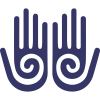People come to me for massage and many a times they tell me before we even start that they want me to use a lot of pressure. Especially on their back. So I want to share my thoughts on that. Does more pressure give you more benefits in massage? Is the no pain, no gain idea valid? And what can it mean if you feel nothing even with strong pressure during a massage?
No pain, no gain?
In massage we are not only working with muscles and bones and joints. We are also working with the nervous system and ultimately we want to calm it down. We are aiming to activate the parasympathetic nervous system which slows our heart and breathing rates, lowers blood pressure and promotes digestion. Our body enters a state of relaxation, and this relaxation facilitates recovery. So, first of all, if we are in pain during a massage, it is impossible to get into that state of rest. The nervous system stays agitated and on the look out for threats and danger.
Furthermore, even if there is no pain, we have to consider something called the stretch reflex. When we passively stretch a muscle, after a certain point which can be different for different people, the nervous system will get worried that the tissues can be injured and will make them contract to protect them. So stretching or pressing the body beyond its natural range of motion or tolerance will activate the stretch reflex and will leave us with even more tension and muscle spasms.
I feel nothing
In Thai massage the therapist uses her or his body weight and is not relying on the strength of the hands and fingers only. So how is it possible for someone to feel nothing while I am pressing down on them with all my weight?
Well, sometimes areas of our bodies become a bit disconnected and desensitised. If we are not using some part of our bodies, the brain kind of forgets about it because there is no sensory input for the nervous system.
The back, especially the upper back and the shoulder blades are one area like that. It is hard to see, hard to reach and many times hard to feel. In addition, there are much fewer nerve endings on our back compared to other parts of our body. For example, if two fingers are touching your back at a small distance, you won’t be able to feel it. You will actually think that it is only one finger. Experiment and see for yourself!
But it’s not only the back that can be desensitised. Sometimes this can happen with any other part of the body. There can be just a single point that feels numb when pressed, feels like less pressure is being applied on it.
The question is then – Is massage beneficial if I feel less or nothing? And the answer must be – it depends. Nevertheless, I think it is worth considering if you have been desensitised because in this case massage can be hugely beneficial. It can help bring those dull, disconnected areas back on the map of the brain, enliven them, reconnect them. This may allow the body to work in a more balanced and natural way and may get rid of tension and stagnation.
Talk to your massage therapist
The best way to navigate these complicated waters is to talk to your massage therapist and share how and what you feel. Don’t ever look for the pain or suffer in silence, it’s not helping, it’s counterproductive. Ask the practitioner to change the pressure as they go. Using one level of pressure for the whole body rarely works well. There are always tender or dull spots along the way and these can change from session to session. Communication really is key!
Related articles:
Massage increases oxytocin, the love hormone
Photo by Jaël Vallée on Unsplash



